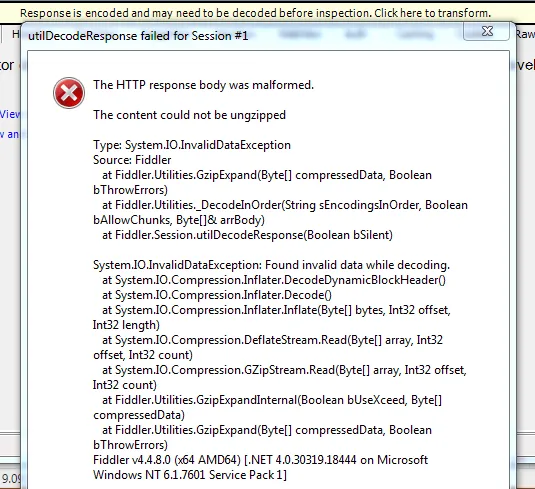如果您可以访问IIS配置
您不能仅应用头文件并希望它被压缩 - 响应将不会被压缩。
您需要删除您添加的头信息,并确保您的IIS服务器已启用动态压缩和静态内容压缩。
评论者中的一位提到了 stackoverflow 上的一个很好的资源链接,展示了如何做到这一点:
启用 IIS7 gzip
请注意,仅在动态压缩已安装(默认情况下未安装于IIS)的情况下,才能通过 web.config 中设置该值来实现。
您可以在 MSDN 文档中找到有关此信息的信息:http://www.iis.net/configreference/system.webserver/httpcompression
简单压缩
以下是使用简单示例进行自定义压缩的示例,该示例使用 Visual Studio 项目模板中的 Web Api MVC 4 项目。要使 HttpResponseMessages 压缩起来,请实现自定义 MessageHandler。请参见下面的工作示例。
请参见下面的代码实现。
请注意,我试图使方法与您的示例相同。
using System;
using System.Collections.Generic;
using System.IO;
using System.IO.Compression;
using System.Linq;
using System.Net;
using System.Net.Http;
using System.Text;
using System.Threading;
using System.Threading.Tasks;
using System.Web;
using System.Web.Http;
namespace MvcApplication1.Controllers
{
public class ValuesController : ApiController
{
public class Person
{
public string name { get; set; }
}
public IEnumerable<string> Get()
{
HttpContext.Current.Response.Cache.VaryByHeaders["accept-encoding"] = true;
return new [] { "value1", "value2" };
}
public HttpResponseMessage Get(int id)
{
HttpContext.Current.Response.Cache.VaryByHeaders["accept-encoding"] = true;
var TheHTTPResponse = new HttpResponseMessage(System.Net.HttpStatusCode.OK);
TheHTTPResponse.Content = new StringContent("{\"asdasdasdsadsad\": 123123123 }", Encoding.UTF8, "text/json");
return TheHTTPResponse;
}
public class EncodingDelegateHandler : DelegatingHandler
{
protected override Task<HttpResponseMessage> SendAsync(HttpRequestMessage request, CancellationToken cancellationToken)
{
return base.SendAsync(request, cancellationToken).ContinueWith<HttpResponseMessage>((responseToCompleteTask) =>
{
HttpResponseMessage response = responseToCompleteTask.Result;
if (response.RequestMessage.Headers.AcceptEncoding != null &&
response.RequestMessage.Headers.AcceptEncoding.Count > 0)
{
string encodingType = response.RequestMessage.Headers.AcceptEncoding.First().Value;
response.Content = new CompressedContent(response.Content, encodingType);
}
return response;
},
TaskContinuationOptions.OnlyOnRanToCompletion);
}
}
public class CompressedContent : HttpContent
{
private HttpContent originalContent;
private string encodingType;
public CompressedContent(HttpContent content, string encodingType)
{
if (content == null)
{
throw new ArgumentNullException("content");
}
if (encodingType == null)
{
throw new ArgumentNullException("encodingType");
}
originalContent = content;
this.encodingType = encodingType.ToLowerInvariant();
if (this.encodingType != "gzip" && this.encodingType != "deflate")
{
throw new InvalidOperationException(string.Format("Encoding '{0}' is not supported. Only supports gzip or deflate encoding.", this.encodingType));
}
foreach (KeyValuePair<string, IEnumerable<string>> header in originalContent.Headers)
{
this.Headers.TryAddWithoutValidation(header.Key, header.Value);
}
this.Headers.ContentEncoding.Add(encodingType);
}
protected override bool TryComputeLength(out long length)
{
length = -1;
return false;
}
protected override Task SerializeToStreamAsync(Stream stream, TransportContext context)
{
Stream compressedStream = null;
if (encodingType == "gzip")
{
compressedStream = new GZipStream(stream, CompressionMode.Compress, leaveOpen: true);
}
else if (encodingType == "deflate")
{
compressedStream = new DeflateStream(stream, CompressionMode.Compress, leaveOpen: true);
}
return originalContent.CopyToAsync(compressedStream).ContinueWith(tsk =>
{
if (compressedStream != null)
{
compressedStream.Dispose();
}
});
}
}
}
}
还要将新的消息处理程序添加到应用程序的配置中。
using System.Web.Http;
using MvcApplication1.Controllers;
namespace MvcApplication1
{
public static class WebApiConfig
{
public static void Register(HttpConfiguration config)
{
config.Routes.MapHttpRoute(
name: "DefaultApi",
routeTemplate: "api/{controller}/{id}",
defaults: new { id = RouteParameter.Optional }
);
config.MessageHandlers.Add(new ValuesController.EncodingDelegateHandler());
config.EnableSystemDiagnosticsTracing();
}
}
}
这个自定义处理程序是由Kiran Challa (http://blogs.msdn.com/b/kiranchalla/archive/2012/09/04/handling-compression-accept-encoding-sample.aspx)创建的。
还有更好的示例实现了入站流的压缩,您可以在以下示例中查看:
此外,我在GitHub上发现了一个非常好的项目,支持所有这些功能。
请注意,虽然我是自己找到这个答案的,但是根据您在评论中的建议,Simon在两天前提出了这种方法。


